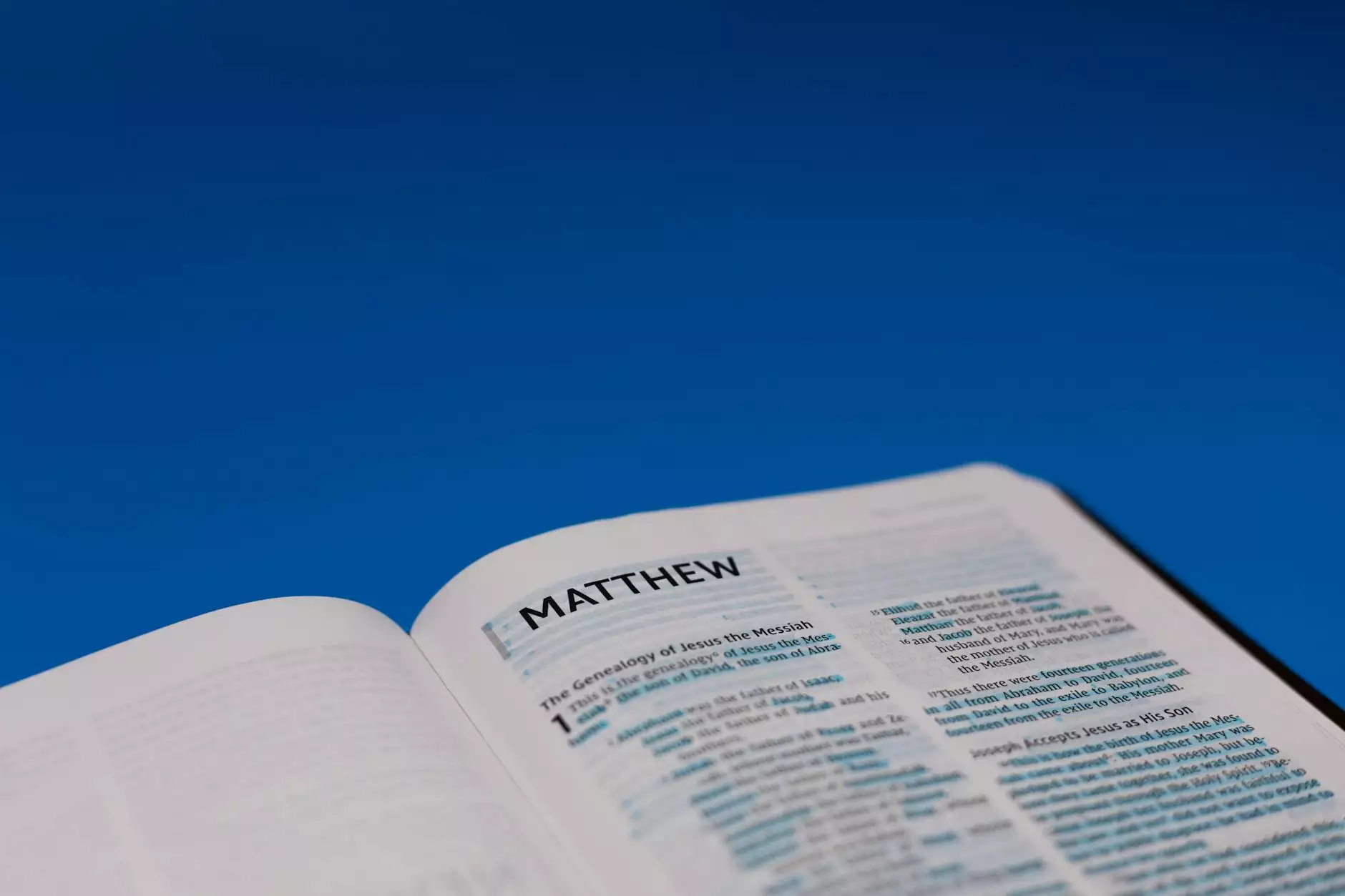Overview of the Catholic Bible and Common Questions About the Bible
Resources
Introduction to the Catholic Bible
Welcome to River Of Life Assemblies Int’l, your trusted source for in-depth insights into the Catholic faith and beliefs. In this article, we provide an extensive overview of the Catholic Bible, shedding light on its significance, structure, and purpose. Whether you are a Catholic seeking a deeper understanding of your faith or simply interested in learning more about the Catholic Bible, this comprehensive guide is here to assist you.
The Significance of the Catholic Bible
The Catholic Bible holds profound significance within the Catholic Church. As the sacred scripture, it serves as a guide and source of spiritual nourishment for millions of Catholics worldwide. This holy text is revered as the inspired Word of God, containing divine teachings, principles, and historical accounts essential to the faith. It is through the Catholic Bible that Catholics gain insight into God's plan for salvation and deepen their relationship with Him.
The Structure of the Catholic Bible
The Catholic Bible is divided into two main sections: the Old Testament and the New Testament. The Old Testament comprises the sacred scriptures that existed before the birth of Jesus Christ, covering the creation of the world, the stories of the prophets, and the laws given to the Israelites. It contains essential books such as Genesis, Exodus, Psalms, Proverbs, Isaiah, and many more, totaling 46 books in the Catholic canon. On the other hand, the New Testament documents the life, teachings, death, and resurrection of Jesus Christ, presenting His message of love, redemption, and salvation. It includes the four Gospels (Matthew, Mark, Luke, and John), the Acts of the Apostles, the Epistles, and the Book of Revelation, making a total of 27 books in the Catholic canon.
Understanding the Catholic Bible's Purpose
The Catholic Bible serves several significant purposes in the life of a Catholic believer. Firstly, it functions as a spiritual guide, providing moral and ethical principles that shape a Catholic's conduct and worldview. The Bible serves as a source of inspiration, encouraging Catholics to lead lives of faith, love, justice, and compassion. Additionally, the Catholic Bible fosters a deeper understanding of God's plan for humanity and the teachings of Jesus Christ. Through studying the Bible, Catholics gain insight into the life of Jesus, His miracles, parables, and His ultimate sacrifice on the cross for the salvation of humanity. It is through this understanding that Catholics are encouraged to live lives aligned with the teachings of Jesus Christ.
Frequently Asked Questions About the Catholic Bible
1. How does the Catholic Bible differ from other Christian Bibles?
The Catholic Bible contains additional books known as the Deuterocanonical books or the Apocrypha, which are not found in most Protestant Bibles. These books, including Tobit, Judith, Wisdom, Sirach (Ecclesiasticus), Baruch, and others, contribute to the richness of Catholic theology and tradition. The inclusion of these books reflects the historical development of the Bible within the Catholic Church.
2. Can anyone interpret the Catholic Bible, or is interpretation reserved for the clergy?
While the Catholic Church affirms the importance of the Magisterium (the teaching authority of the Church) in interpreting the Bible, it also encourages individual Catholics to engage in personal Bible study. The Church recognizes the role of the Holy Spirit in guiding the faithful in understanding the Scriptures. However, it is advised to seek guidance from trusted clergy and consult approved Catholic commentaries to ensure proper interpretation and avoid misinterpretations.
3. What is the importance of reading the Bible regularly for Catholics?
Regular reading of the Bible is highly encouraged for Catholics as it nourishes their spiritual growth and deepens their relationship with God. By immersing oneself in the Word of God, Catholics gain wisdom, guidance, and inspiration to navigate life's challenges, make moral choices, and grow in holiness. Through scripture, Catholics encounter the living God and find comfort, encouragement, and hope in His promises. It is through diving into the Bible that Catholics can encounter the transformative power of God's Word in their lives.
4. Are Catholics allowed to interpret the Bible differently on certain teachings?
Catholic teachings are guided by the Magisterium, which ensures the preservation and correct interpretation of the deposit of faith. While Catholics are encouraged to engage in personal Bible study, the Church emphasizes the unity of faith and the importance of adhering to the official teachings of the Church. Catholics should approach scriptural interpretation with humility, seeking to align their understanding with the teachings of the Magisterium.
5. Are there any recommended resources for studying the Catholic Bible?
There are numerous resources available to aid in studying the Catholic Bible. Apart from the Bible itself, Catholic commentaries, study guides, and books written by respected theologians can greatly enrich one's understanding of the Scriptures. Additionally, joining Bible study groups within the Catholic community can provide opportunities for deep discussion and shared insights. It is always beneficial to seek guidance from knowledgeable priests or spiritual directors to ensure accurate interpretations of the text.
Conclusion
River Of Life Assemblies Int’l aims to provide a comprehensive overview of the Catholic Bible and address common questions about this sacred text. The Catholic Bible holds immense significance within the Catholic Church, serving as a spiritual guide, a source of divine teachings, and a means to deepen one's relationship with God. It is through the study and understanding of the Catholic Bible that Catholics can navigate life's challenges, grow in faith, and live out their beliefs. We invite you to explore further, dive into the richness of the Catholic Bible, and embark on a transformative journey of spiritual growth and discovery.










